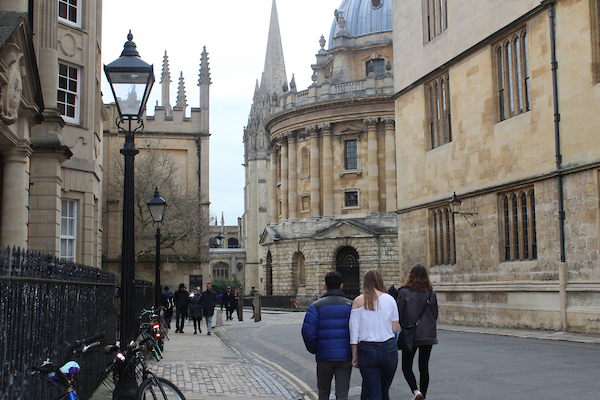Some Thoughts on the Unexpected Benefits of Traveling Solo


Traveling
During the six-week Easter break afforded to me at Oxford, I accomplished some travel. This was about a month and a half’s worth, most of it alone, as I took trains around the South of France and Alpine Austria, did a pilgrimage to Lourdes, and spent a frankly unnecessarily long time in Bordeaux. There’s something to be said for entering spaces in which ONE has an occasionally faulty grasp of the shared language. Separated from everyone I knew from home and everyone I’d met on my program, I found that there was no one, really, to perform my identity for. Interactions with people were simple—I spoke restaurant French more than anything else, said “pardon” quite a bit, and asked liturgical questions precisely thrice. And all the while I could walk around and overhear discussions, observe expressions and gestures, and still be able to weave my way in and out of the different discourses floating up around me: understanding, after all, had to be active.
This was a very intriguing experience—one to which I’d obviously never have had access at home. When you have to keep yourself company, you can almost only be sincere—likewise to the people that I met, toward whom I could do nothing, in my passable but pas-coulant French, but be amenable, engaged, and happy for the opportunity to communicate.
Interactions with strangers
When a stranger in a new leather jacket (tags still on!) asked me to take a picture of him with his expensive camera, I was as polite and nice as I knew how to be. He was thrilled. The same thing happened when an older man offered me a brief tour (with indulgent English charitably sprinkled throughout) of the Saint-Seurin. These were splendid interactions—the former was infectiously happy, and the latter sang some chants with me and gave me a postcard of a Fra Angelico Annunciation. But at home, where I’d be familiar with the geography and suspicious of anyone who tried to break up my routine, I never could have accepted the terms of those conversations as they were offered. I couldn’t function as a well-meaning blank slate toward which other kind people could derive fulfilment from being pleasant, and could never participate in a friendly exchange that pure.
Key takeaways from this experience
In my studies I’m more or less obsessed with analyzing language, discourse, pragmatics, and so on. But here everything was refreshingly clear. I’ve never felt more like a “traveler”—and more comfortable with that disconnection. It made me realize that if you play your cards right and have the appropriate neuroses, you can have real interactions without artifice when you go abroad. Not even the casual artifice people have with their friends, involved in the basic day-to-day performance of themselves. And this is precisely the sort of niche, very unique sensation that I was hoping I could experience away from home.
As a consequence, I found it easy to be more mindful of both myself and of the space. The architecture—beautiful enough in Oxford—was gorgeous in France and Austria, because I was experiencing it as true scenery and not some new component of my daily life to get used to. This is trite horizon-broadening, but it makes you think: experiences can resonate so well—and sensory quality achieve so much more salience—when you’re not a participant in what you’re looking at.
I’d conclude by simply saying that this isn’t to fetishize the unfamiliar. If anything, it reinforces how things don’t really change from place to place. The emphasis is on the observer. And if there’s an opportunity in an unfamiliar environment to reduce yourself to this role—to be someone who can perceive their milieu and enjoy the increased self-awareness this disconnection brings in relation to beautiful, imposing surroundings—then you should take it. Maybe then, like me, you can find a way to be interested in Palladian architecture after 12 weeks of finding it more or less impressive but nothing worth taking pictures of. And isn’t that what study abroad is all about?
Zachary D. | Literature major | Hamilton College | University of Oxford Partnership in England | Spring 2019